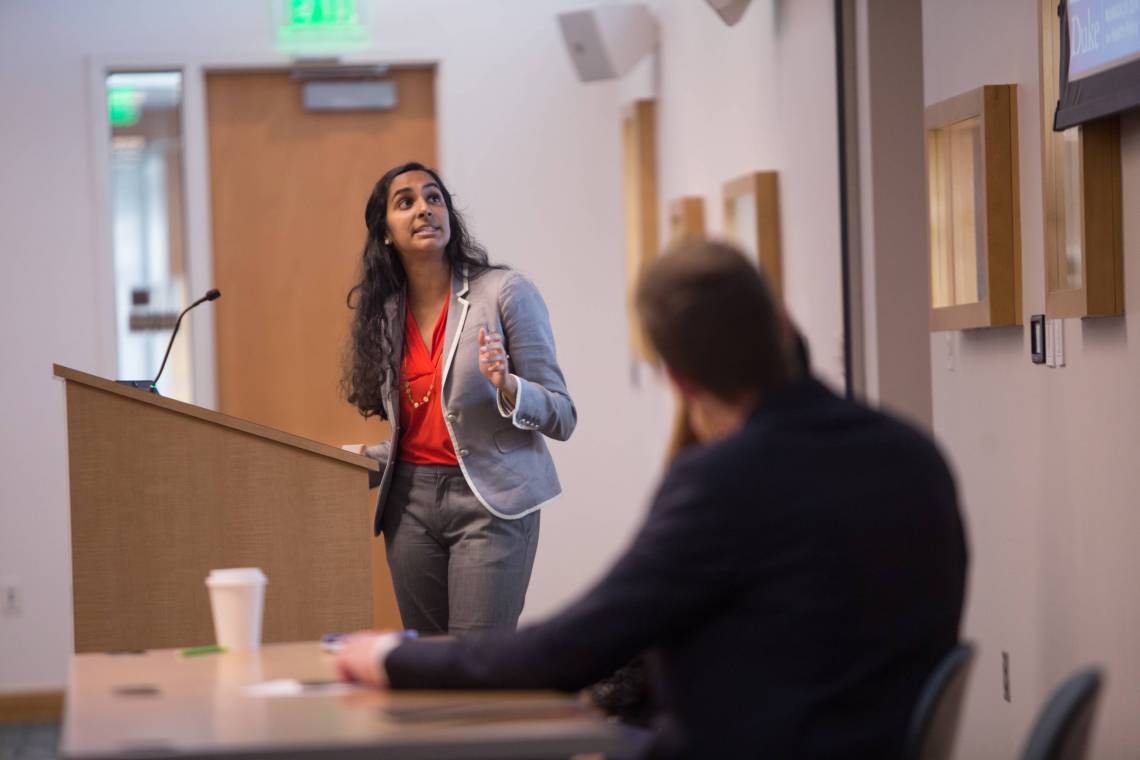In Her Own Words: A State Health Official On How Bass Connections Shaped Her Career

In 2016, a research team with Duke’s Bass Connections program began studying Medicaid reform in North Carolina. Spurred by the state’s plan, announced a year prior, to shift Medicaid from a fee-for-service model to managed care, the team spent a year crunching data and interviewing health officials, legislators, advocates, business executives and others involved in health care. The project was organized by the Duke-Margolis Center for Health Policy.
The result was a series of recommendations based in part on the holistic philosophy that a number of factors -- housing, employment, access to transportation and family issues -- all play into a person’s health needs.
They must have done something right. Later this summer, the state will unveil its new Medicaid program, and it will include features suggested by the Duke team.
“We recommended Medicaid should use a standardized survey tool to ask about things like homelessness and food insecurity, and that is exactly one of the things Medicaid is doing. We recommended using flexible Medicaid funding for housing and food, and that’s exactly the kind of program they developed,” said Madhu Vulimiri, who was a master’s student in the Sanford School of Public Policy at the time. “Of course, Duke isn’t the only group advocating for these things; there’s been a growing message about it. But looking back, that’s a really exciting development that we were part of the team making that recommendation.”
Read MoreVulimiri likely has a more comprehensive view of this long process – and Duke’s role in it – than anyone. She began studying the Medicaid reform issue in 2016 as part of the Duke Bass Connections team that researched the issue and made recommendations to state officials.
'After graduating, she went to work for the state's Medicaid program in the North Carolina Department of Health and Human Services (NCDHHS), spending two years on that transformation before joining the Office of the Secretary at NCDHHS as a senior strategy advisor in March 2020 -- just as the COVID-19 pandemic began creating global chaos.
From her first day there, Vulimiri – a Morrisville native who earned a bachelor’s degree from UNC Chapel Hill before coming to the Sanford School of Public Policy at Duke – has spent most of her time on COVID-19 response. In that chaotic year, she’s had to work with government colleagues from a broad swath of backgrounds, some of whose expertise is outside the health care and policy realm. Looking back, she said her time at Duke – on a Bass Connections team designed to bring undergraduates, graduate students and faculty members from myriad fields together – prepared her well for the experience.
She discussed her experiences with Duke Today. Here are excerpts:
On Her Bass Connections Experience
“I saw this opportunity with Bass to really learn about, research and really understand what was happening with Medicaid reform – and offer recommendations. There was an opportunity to really weigh in and provide some recommendations about what a new model should look like. That’s why I got involved.
“We did a lot of interviews. We talked to folks who worked at DHHS; who worked at the legislature. Health care executives, advocacy groups, researchers. It was really exciting to get exposed to the different players in the Medicaid environment and see how they were connected.”
“An important part of the work we did – we had a presentation in Raleigh where we invited government leaders, legislators, advocacy groups, and we shared our results and recommendations with those stakeholders. We’re not doing this research just to do it; we’re doing it to influence policy and to raise important questions that policymakers might not have considered.”
“And now being on the policy side, I really value when groups come and share those recommendations because we may not always have the expertise to do the research that partners at places like Duke can do.”
On her current work with N.C. Department of Health and Human Services
“This whole year since March 14, I have been fulltime working on COVID-19 response for the state of North Carolina. I started initially working closely with the Department of Public Instruction to make sure that so many children who rely on school lunches, how are they going to get fed? How are we going to help essential workers get childcare? My early time in the pandemic was focused on response effort around food, childhood, remote learning and education.”
“In the summer I started working on childcare programs, figuring out how to distribute funds, did a lot of work around school reopening.”
“One of the really cool things about Bass is the interdisciplinary nature of the work. The whole gestalt of Bass is to bring students and researchers from different disciplines together. That helped me working here at DHHS.”
“I think we all brought different perspectives and strengths to the table. I think that’s one of the most transferable things. We don’t work in silos. At DHHS we work in a matrix format with people from different backgrounds and sectors. During COVID: I’d never worked with education folks before but we had to work very closely with people from public instruction. So that interdisciplinary work, that experience working on issues that are inherently cross-discipline, it really helps see how each student and each group they’re coming from had a very important lens.”
Read More: Duke Seniors Discuss their Bass Connections Experience